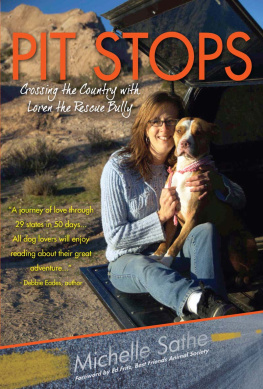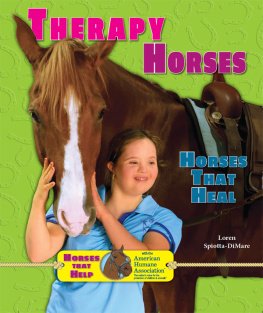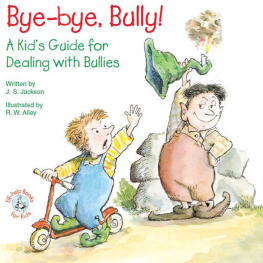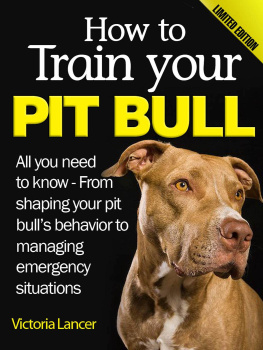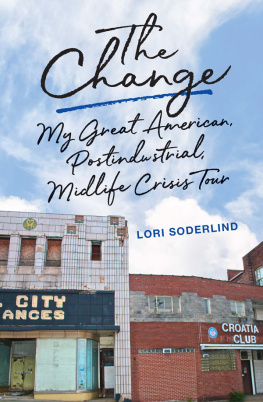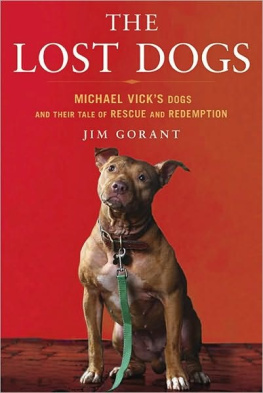Pit Stops
Crossing the Country with Loren the Rescue Bully
Michelle Sathe
Pit Stops: Crossing the Country with Loren the Rescue Bully
Copyright 2010 by Michelle Sathe
All rights reserved. No part of this book may be reproduced or transmitted in any form or by any means without written permission of the author.
First Edition
Cover design: Lynn Ammerman
Front cover - main photo: Will Davison
Front and back covers - inset photos: Michelle Sathe
Interior design: Michelle Sathe
All interior photos by Michelle Sathe (except for Murphy and Daisys photo, courtesy of Hello Bully)
ISBN 978-0-615-38699-7
Printed in the United States of America

To Wayde Dyer, for loving this crazy dog lady and taking care of our pack
To Nancy Anderson of The Brittany Foundation, for rescuing Loren and thousands of dogs like her
To Yvonne Allbee, for being my biggest cheerleader and starting me on this path
To my Brittany Foundation family - April Lund, Heather Mohr, Leeanne Shinn, Rene Ruston, Gina Tucci, Karen Kennedy, et al. - for loving homeless dogs as if they were your own
To my sober mountain sisters - Gail K., Liz B., Ronni W. and Eileen B. - for encouraging me to trudge this road of happy destiny
To Jim and Rose Sathe, for AAA, Gidget and indulging my adventurous spirit
To Margos Bark Root Beer, Dog-o-Scopes, and all my friends and family who made this dream a reality
To all the rescuers, shelter staff, advocates and volunteers we met along the way, for sharing your stories and your spirit
To the millions of animals who die in shelters or suffer at the hands of cruel humans, for letting me be your voice. RIP.
To Stefan Niemczyk, for giving Loren what I never could
To Loren, for being the best four-legged friend anyone could ask for - may your road ahead always be happy, sweet girl
Foreword
When asked to write the foreword for this story of Michelles journey with her companion, Loren, I was to keep two things in mind. One, to discuss briefly how the pit bull went from one of Americas favorite dogs to the most feared, victimized, and destroyed in our public shelter system. The other was to relate how the efforts of just one individual or the rescuing of one individual dog can be so crucial to raising the value of these animals in our human society.
What is a pit bull anyway? I think that the most accurate definition is one I heard from Don Cleary of the National Canine Research Council, that a pit bull is a folk devil. A character set in a larger tale that has been taking place in America since at least since the late 1800s.
A social construct has been built, that of a dangerous, vicious killer of a dog. All positive canine traits have been stripped away - loyalty, devotion, friendship, obedience, trustworthiness - while only negative traits remained.
The pit bull has ultimately become something of a mythological villain, both beloved and victimized by the human race.
Human beings need villains. I guess it helps us feel successful in our quest for goodness, or godliness. The quest for morality is naturally human. I suspect that this stems from the need to understand. Creating villains, though, seems to undermine the idea of personal responsibility.
After all, if the boogie man is real, there is really nothing you can do about it. Its not your fault. If the dogs are at fault for their behavior solely because of their genetics (they are born with it, or its in their blood), then why do we need to learn how to care for them properly? Why should they even be allowed to live? Pit bulls have paid a very high price for this philosophy.
More practically, a pit bull is the term used to define a group of dogs that meet subjective, visual characteristics. This is a term that has also taken on the image and character of the substandard owner and those that are associated with the seedy world of crime, cruelty and senselessness. Not entirely, but certainly most loudly.
The media, since the July 1987 issue of Sports Illustrated magazine, has shouted this image through its 24/7 information megaphone. That issue had, as its cover, the face of a brindle dog with a focus on its shiny white teeth, warning the photographer of the urgency to snap that shot.
By the end of that year, every major media news publication wrote damning stories of dogs labeled as pit bulls.
It seemed that regardless of the breed of dog, if the behavior was inappropriate, or dangerous, that dog was a pit bull. If a dog was a hero, friend or companionwell, it was the quintessential family dog, not a pit bull. Good dog traits like loyalty, trust and friendliness were taken away from these short-haired muscular mutts and their papered canine brethren: the American Pit Bull Terrier, American Staffordshire Terrier, Staffordshire Bull Terrier, et al.
It may sound strange, but as it turns out, Michael Vick, the professional football player that served time for operating a kennel to supply dogs for fighting, seemed to play the catalyst for the animal welfare movement and dog-loving Americans across the country to change the course of a national debate.
Vicks arrest and conviction put the plight of these dogs on the kitchen table of mainstream America. People from all walks of life were shocked and horrified by the detailed and gruesome accounts of Vicks sordid choice of entertainment. Pit bulls finally started receiving some good press. Even Sports Illustrated changed its tune. In December 2008, the magazine ran a wonderful story by Jim Gorant about the recovery of some survivors of Bad Newz Kennels. On the cover was a photo of a sweet pit bull named Jasmine.
For the first time dogs recovered from this type of crime were going to get a chance at being evaluated as individual, sentient beings. And since then, there has been a national trend from municipal shelters, animal control agencies, law enforcement, and local to federal politics, to see that the dogs are treated as victims of cruelty and not willing participants or villains.
I feel lucky to have played a small role in this national debate. It has led me to meet some wonderful people filled with compassion and a drive to lead an effort to help us all become more responsible with the animals that depend on us. Michelle is one of these people, and her story of traveling the country to learn about pit bull issues, and promote a wonderful dog named Loren in a quest to find her a permanent and loving family to call home, is a touching one.
You dont have to love dogs or own dogs in order to help our country achieve a time of no more homeless pets. All you need to do is to be responsible in digesting and disseminating information.
If I have learned one thing by working on the Best Friends campaign Pit Bulls: Saving Americas Dog under the wing of a pioneer in animal law, Ledy VanKavage, it is that one person CAN make a difference, whether its being a voice for animals or voting.
As Ledy will proudly broadcast - Politics is not a spectator sport!
If you are a dog person, you will be tickled by Michelles accounting of all of the people she meets along the way due to the captivating nature of a homeless canine named Loren.
I marveled at Lorens ability to make us friends. No one ever just came up to me and started talking. What a blessing she was. How impossibly lonely Id be without her.
Read this book. Cry if you have to, but finish it. Then go to your local shelter or rescue and help your community.
You will be well rewarded!
Sincerely,
Ed Fritz
Campaign Specialist, Pit Bulls: Saving Americas Dog

